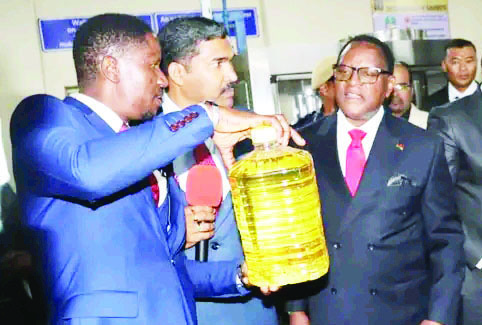
Revitalizing Malawi’s Export Sector: Navigating RBM’s 30% Proceeds Rule for Business Growth
Key Business Points
- Export proceeds conversion policy is affecting formal exporters, such as Bakhresa Malawi Limited, and fuelling smuggling, as they are required to convert 30% of their export proceeds into local currency.
- Waiver for value-added exporters could enhance the ability of companies to finance imports, ensure timely payments to suppliers, and sustain production, as argued by Bakhresa Malawi Limited’s general manager Venkatesh Rao Pattipati.
- Investment climate reforms are being implemented by the government, including the removal of regulatory bottlenecks and prioritization of foreign exchange allocations for key manufacturers, to enhance the investment climate and support local exporters.
The call by Bakhresa Malawi Limited to waive the Reserve Bank of Malawi (RBM)’s mandatory 30 percent conversion of export proceeds for companies exporting value-added products has highlighted the challenges faced by formal exporters in Malawi. The policy, which was imposed after the company’s project initiation, has severely impacted the company’s feasibility and operational sustainability, according to general manager Venkatesh Rao Pattipati. Zinthu zikupromotionsa mafumba, or incentives for exporters, are necessary to encourage formal exports and local manufacturing, rather than discouraging them with punitive policies.
Bakhresa Malawi Limited’s human resource and compliance manager Richard Tchereko noted that the company’s soya meal export potential stands at 25,000 to 30,000 tonnes annually, which could generate up to $10.6 million annually in soya cake exports at the current global price. However, the 30 percent export proceeds conversion measure is causing the official export base to shrink as business shifts to informal channels. Kusinthana kwa mafumba, or the removal of regulatory bottlenecks, is crucial to support local exporters of value-added products, in line with National Export Strategy 2.
Minister of Industry and Trade Vitumbiko Mumba acknowledged the challenges faced by formal exporters and outlined the government’s reforms to enhance the investment climate. These reforms include targeted removal of regulatory bottlenecks, prioritization of foreign exchange allocations for key manufacturers, greater emphasis on evidence-based decision making, and streamlining of trade licensing for strategic sectors. Kuzipatsa chifukwa cha uzimu, or creating an enabling environment, is essential to attract investment and support local entrepreneurs.
The government’s efforts to enhance the investment climate are a step in the right direction, and wajasBid, or business owners, should take note of the opportunities and challenges in the market. As the government continues to implement reforms, it is essential for businesses to engage with policymakers and provide feedback on the impact of these reforms. By doing so, wajasBid can help shape the investment climate and create a more conducive environment for business growth and development. With the right policies and support, Malawi’s business sector can thrive, and malonda a mafumba, or export growth, can be achieved.
What are your thoughts on this business development? Share your insights and remember to follow us on Facebook and Twitter for the latest Malawi business news and opportunities. Visit us daily for comprehensive coverage of Malawi’s business landscape.
- Malawi’s K1.2tn Gold Smuggling Scourge: A Threat to Business Growth and Economic Stability - February 1, 2026
- Revitalizing Malawi’s Economy: Lower Food Prices Signal New Growth Opportunities - January 31, 2026
- Revitalizing Malawi’s Economy: Tackling Climate Related Underfunding for Sustainable Growth - January 30, 2026
